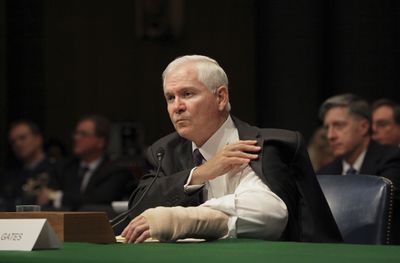U.S. troops in Afghanistan may double by late summer
Gates says more civilian casualties must be avoided

WASHINGTON – Defense Secretary Robert Gates said Tuesday “we are lost” unless the United States can find a way not to kill so many civilians in the pursuit of militants in Afghanistan and that flooding the chaotic country with U.S. troops would be a disaster.
Gates, the only Republican Cabinet member whom President Barack Obama asked to stay on, told a Senate panel that the Pentagon could send two more brigades to Afghanistan by late spring and a third brigade by late summer to try to salvage a war that has ground to a grim standoff with entrenched and resourceful militants.
The U.S. is considering doubling its troop presence in Afghanistan this year to roughly 60,000, still less than half the number currently in Iraq and a modest commitment when compared with the “surge” of U.S. forces and resources credited with turning around a flagging fight in Iraq.
But Gates said he is deeply skeptical about adding any more U.S. forces beyond that, in part because military dominion in Afghanistan has failed for every great power that tried it.
“The civilian casualties are doing us an enormous harm in Afghanistan, and we have got to do better,” to avoid innocent deaths, even though the Taliban militants use civilians as cover, Gates told the Senate Armed Services Committee. “My worry is that the Afghans come to see us as part of the problem, rather than as part of their solution. And then we are lost.”
Bracing and blunt, Gates outlined an agenda for Afghanistan that is closely focused on U.S. strategic needs in a battle against terrorism and extremism, and that trims the democratic ambitions of the Bush administration.
“We need to be very careful about the nature of the goals we set for ourselves in Afghanistan,” Gates said.
The United States should keep its sights on one thing: preventing Afghanistan from being used as a base for terrorists and extremists who would harm the U.S. or its allies, Gates said.
“Afghanistan is the fourth or fifth poorest country in the world, and if we set ourselves the objective of creating some sort of Central Asian Valhalla over there, we will lose,” Gates said, referring to a haven of purity in Norse mythology. “Nobody in the world has that kind of time, patience or money, to be honest.”
Gates joined U.S. fortunes in Afghanistan to the related struggle against extremism in Pakistan, but signaled no reduction in U.S. missile strikes or other raids that infuriate both peoples and besmirch the U.S.-backed governments in Kabul and Islamabad.
“Both President Bush and President Obama have made clear that we will go after al-Qaida wherever al-Qaida is and we will continue to pursue them,” Gates said.
Adm. Mike Mullen, chairman of the Joint Chiefs of Staff, also indicated missile strikes will continue. He said rules for using missiles in Afghanistan were carefully set, and while the Pentagon has studied possible changes to the rules the U.S. commander there has not asked for one.
“I don’t think we can succeed in Afghanistan, if civilians keep dying there,” Mullen said. “And we’ve got to figure out a way to absolutely minimize that, the goal being zero.”